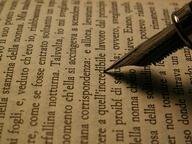Quiz Answer Key and Fun Facts
1. Siegfried Sassoon was one of the leading poets of which war?
2. What autobiographical novel by Siegfried Sassoon won the Hawthornden Prize and the James Tait Black Memorial Prize?
3. Siegfried Sassoon was admitted to a military psychiatric hospital where he formed a friendship with what other war poet and author of "Dulce et Decorum Est"?
4. What was the title of Sassoon's first book, published in 1913?
5. Which of the following poems was NOT written by Siegfried Sassoon?
6. "Down, and down, and down, he sank and drowned, / Bleeding to death. The _____ had failed." What failed?
7. What Siegfried Sassoon poem describes a dying soldier as he moves in and out of consciousness?
8. "You love us when we're heroes home on leave / Or wounded in a mentionable place. / You worship decorations you believe / That chivalry redeems the war's disgrace." What Siegfried Sassoon poem opens with these lines?
9. "The anguish of the earth absolves our eyes / Till beauty shines in all that we can see. / War is our scourge; yet war has made us _____." What word is missing from his blank?
10. "'Good-morning, good-morning!' the _____ said / When we met him last week on our way to the line. / Now the soldiers he smiled at are most of 'em dead, / And we're cursing his staff for incompetent swine." Who said good morning?
11. In Sassoon's "Ancient History", what Biblical man contemplates the murder of his son at the hands of his other son?
12. "Soldiers are _____; when the guns begin / They think of firelit homes, clean beds and wives." What are soldiers?
13. Siegfried Sassoon wrote a biography of what Victorian English novelist and author of the poetry collection "Modern Love"?
14. "The Wednesday Play", a British television anthology series, put out an episode in 1970 that centered on Siegfried Sassoon's wartime experiences. It took as its title a nickname Sassoon had earned from his fellow soldiers. What was it called?
15. To what religion did Sassoon convert toward the end of his life?
Source: Author
skylarb
This quiz was reviewed by FunTrivia editor
looney_tunes before going online.
Any errors found in FunTrivia content are routinely corrected through our feedback system.

